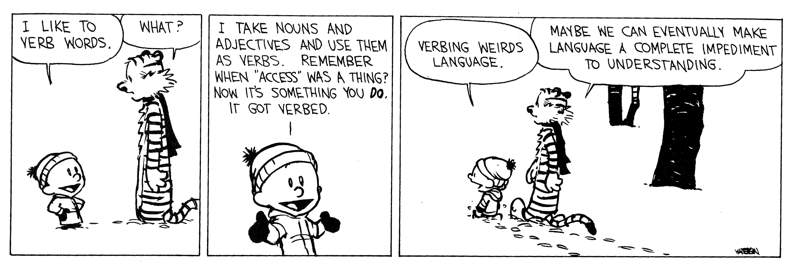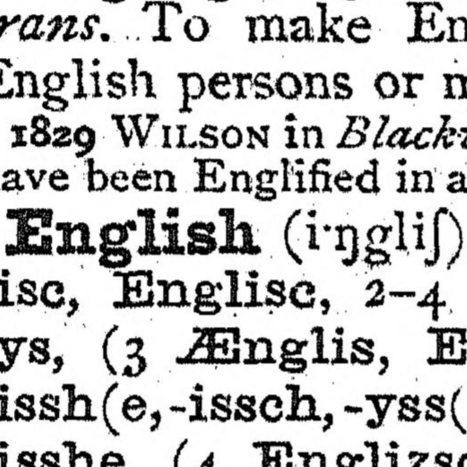For example, if you say that “feed” isn’t a real word because there is a better way to say “issued someone a fee,” but the real word is “feed” as in “to provide with nourishment,” what would that error in judgment be called?

Calvin and Hobbes was more popular 25 years ago though. Maybe its a more appropriate joke to say the same about “Google” and how to perform “Googling”.
The actual English word for what’s going on here is called a Gerund. In many cases, it is possible to unambiguously turn a noun into a verb by adding ‘ing’ on the end. After a while, people use the “Gerund” form more often (ex: I’m googling that idea), that they forget that the original word was a noun. After a few years of this, people remove the “ing” and now its a verb. IE: “To Google for information”.
That is not quite what I’m getting at, but thank you.
“Fee” -> “Feed”, as per your first example is this (non-official) tendency of American speakers to “Verb” words, as the Calvin and Hobbs comic puts it. The more official path is the Gerund as I said before. Fee -> Feeing sounds wrong and is uncommon. But other “nouns” can turn into verbs like Subpoena -> subpoenaing, or the Google -> Googling example of my earlier post.
So from the Gerund and the Noun-into-verb transitions, Fee -> Feed is somewhat correct. The problem is that it
-
Creates a Homonym, which is confusing. (Animal Feed is different from being issued a Fee)
-
Feed (defined as “to issue a fee”) is not common.
So between #1 and #2, its a bad idea. So its seems unlikely to me that such a verbing would ever catch on.
Calvin and Hobbs pokes fun at this whole “turn nouns into verbs” thing by using the noun “Verb” and turning it into the verb “verbing”. So everything here is common English, perhaps not how its been taught… but its truly how Americans use the language.
If a popular celebrity comes out 5 years from now and uses the word “feed” as in, to issue a fee to someone else, then our language will change. Its a very free-form kind of language, and its why our rules are so inconsistent. We are constantly copying the cool, the popular. It literally changes words, like the word “Literally” that means “figuratively” these days.
Or “No Way”, which can often times mean “yes”. We break rules and mix up words all the time, just as a meme and as fun. And it becomes official language when enough people do it.
-
I don’t really understand your question. Feed meaning “to offer sustenance” has a different etymology than the noun fee meaning “amount paid.” While virtually any noun in the language can be made a verb, it seems unnecessary in this case since to charge is available and already expresses this meaning.
(I can’t think of a way to word this to sound playful, so please understand I’m just being silly and have no animosity)
You really don’t understand the question if you’re bringing up etymology :P
LOL! Touché!
It’s a matter of context, not etymology.
In this context, only etymology is relevant.
I think you’re essentially confusing homonyms (or forgetting one of them). A homonym is “One of two or more words that have the same sound and often the same spelling but differ in meaning, such as bank (embankment) and bank (place where money is kept).”
Also, it’s kind of funny that “feed” as in “issued someone a fee” isn’t an accepted word when “fine” is (which is also a homonym :)
If you said “feed” meaning “issued someone a fee”, I think someone would be correct in claiming that “feed” is not a real word, meaning a word having that particular definition and in common usage. There is no word with that definition in common usage. Words aren’t just arrangements of letters, after all, they also have pronunciations and meanings.
Now, if we were playing Scrabble, and I tried to argue “feed” wasn’t a real word, I’d be wrong, because Scrabble is only concerned with spellings.
correct in claiming that “feed” is not a real word
Not in this context, since to fee isn’t a verb.
Do you mean that used-car salesman dialect where they’re “efforting the ask for the spend” and similar embarrassments?



